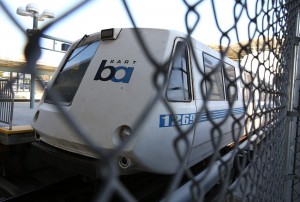
BART and its two biggest employee unions finally got back to negotiating today — more than a month after Gov. Jerry Brown declared a 60-day cooling-off period to avert the system's second strike of the summer. The unions — the Amalgamated Transit Union Local 1555 and the BART chapter of SEIU Local 1021 — have castigated the agency for failing to come back to the bargaining table sooner. BART has faulted the unions for failing to move on the central issues in the contract dispute: wages, health-care benefits, and pensions. With a new strike deadline set for midnight Oct. 10, there's no sign that either side has moved an inch from their earlier positions.
(Those positions, very briefly: The unions have sought a pay increase of about 20 percent; BART is currently offering half that. BART wants to increase workers' monthly payments for health care, currently $92 a month even for family coverage. And the agency wants workers to start contributing to pensions — though the unions argue they long ago made concessions that help the agency cover their pension payments.)
Brown appeared today at an event promoting electric vehicles at San Francisco's Exploratorium. Reporters went off-topic and asked the governor about the BART talks and about a request from state Senate Republican Leader Bob Huff to call a special session of the Legislature to consider legislation to block further BART strikes. Here's an exchange captured by KQED reporter Bryan Goebel:
Brown: "I am concerned about BART because they're not negotiating, and they better get back to the table. The special session was considered and rejected in the Legislature. So, I think the folks at BART and the union had better sit down because it could be a real problem."
Phil Matier (S.F. Chronicle/KPIX): "What are you gonna do if they don't?"
Brown: "Well, I've exercised my power and that was the cooling-off period. It's now within the framework of collective bargaining, which says that both sides talk together, but if they don't agree workers can go on strike. But I would urge them very strongly not to do that."
Doug Sovern (KCBS): "...now introducing a bill for you to call a special session to outlaw a strike."
Brown: "Look, we were in session. The matter was discussed and rejected."
Matier: "Why was it rejected?"
Brown: "Neither side wanted to do it. Neither the management nor the union have shown any appetite for binding arbitration. I do not want to see a strike. I urge the parties to get real."
Sovern: "Is there anything you can do? Is it sort of hands off from your point of view now? You did the cooling-off period..."
Brown: "We have the law. I was prepared to introduce a bill to stop the strike but that, after discussions with various leaders, that was not thought as something that could pass."